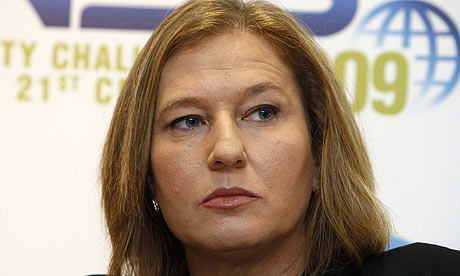
Israeli military cancels UK visit over arrest fears
Rory McCarthy in Jerusalem
Jan. 5, 2009
The Israeli military has cancelled a visit by a team of its officers to Britain over fears that they risked arrest on possible war crimes charges.
It is the latest case in which high-profile Israeli politicians or army officers have pulled out of visits to Britain for fear of arrest over war crimes allegations under laws of universal jurisdiction.

After a British arrest warrant was issued for Tzipi Livni on war crimes charges – later withdrawn on discovery that she was not in the country – a number of Israel leaders and army officers have cancelled UK visits Photograph: Gil Cohen Magen/Reuters
Israeli leaders have grown increasingly frustrated about the threat of legal action against individuals and are pressing the British government to change the law.
Baroness Scotland, the attorney general, was in Israel today and due to meet with the Israeli justice minister, Yaakov Neeman, and deputy foreign minister, Danny Ayalon, to talk about the issue.
A group of officers, reportedly from the rank of major up to colonel, were invited by the British army for a meeting on military co-operation but cancelled last week, the Guardian has learned.
According to the Israeli paper Yedioth Ahronoth, Israeli officials feared possible arrest warrants and contacted British authorities to demand a guarantee that the officers would not be arrested.
Last week, British officials, reportedly, said they could offer no such guarantee and the Israeli military promptly cancelled the visit. The Israel Defence Force declined to comment.
Three weeks ago a British court issued an arrest warrant for Tzipi Livni, the former Israeli foreign minister, at the request of lawyers acting for Palestinian victims of Israel's war in Gaza. The warrant was withdrawn when it became clear Livni was not in the country but it provoked a storm of protest in Israel.
Ayalon said the issue was damaging Israel's relations with Britain. "The risk to senior Israeli figures does concrete and immediate damage to bilateral relations," he told Yedioth Ahronoth.
"Organisations that are hostile to Israel try to exploit the legal channels and legal tools to threaten the Israeli and British decision-makers, including the authorities of the attorney general herself, and to thereby create political facts that should be determined around the diplomatic negotiating table," he added.
He said he would raise the issue in his meeting with Baroness Scotland.
After the Livni arrest warrant there were discussions in Britain about changing the legal process so that the attorney general would first approve warrants before suspected war criminals could be arrested.
The "safeguards" were to apply to all visiting foreign leaders, not just Israelis, but provoked outrage from lawyers.
In October, Moshe Ya'alon, a former general and current cabinet minister, turned down an invitation to visit London for fear of arrest over an Israeli air strike in Gaza dating back to 2002.
A week earlier lawyers tried to secure an arrest warrant against Ehud Barak, Israel's defence minister, while he was visiting Britain but it did not succeed since as a serving minister he still has diplomatic immunity.
In 2005 an Israeli general, Doron Almog, was nearly arrested by police at Heathrow airport for a private prosecution again based on military operations in Gaza but he was tipped off, did not leave the plane and flew out of the country avoiding arrest.
www.guardian.co.uk/uk/2010/jan/05/israeli-military-uk-arrest-fears
